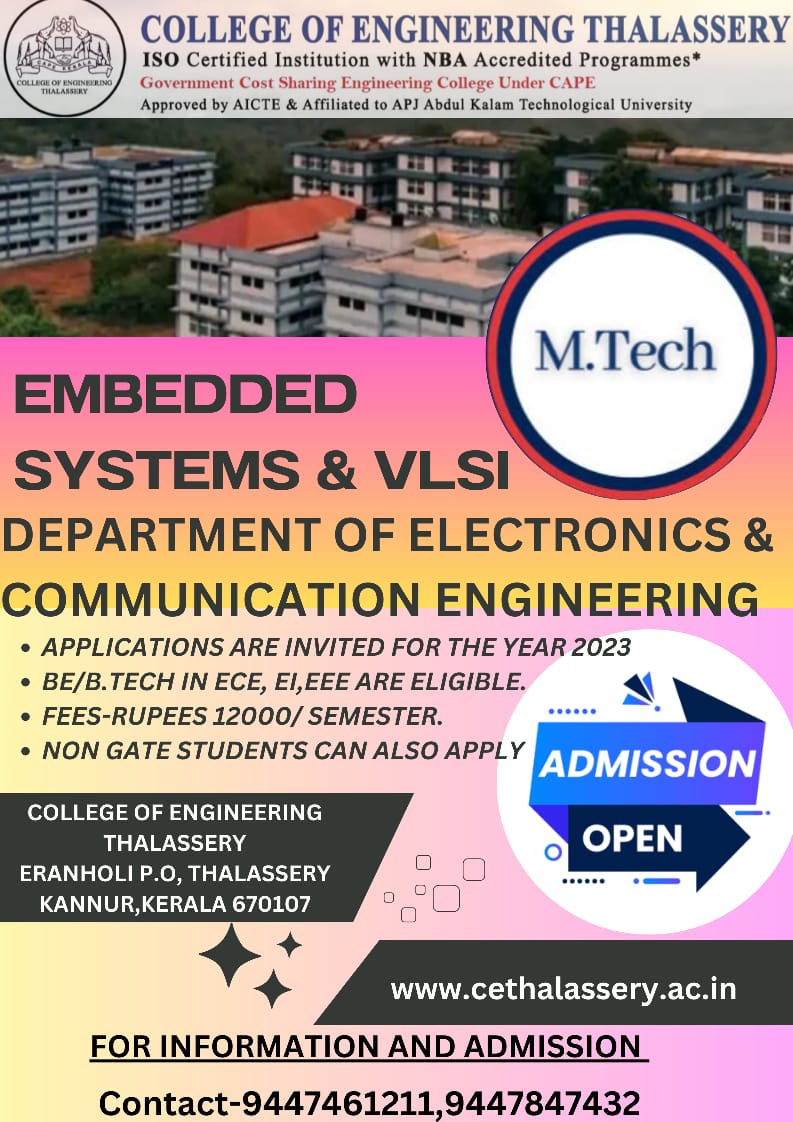Department of Electronics & Communication Engineering
The Department of Electronics and Communication started functioning from the beginning of College itself in the year 2000. The Department is backed up by highly qualified and dedicated teachers who are periodically deputed to participate in various Faculty development programs to keep in pace with the latest developments in the world of Electronics and Communication. They further tune the students into most prominent and most promising intellectuals. The Department offers both UG (B.Tech) and PG (M.Tech) programs.
IN-HOUSE PROJECT & TRAINING
The Main Project & Mini Projects related to the course are done as "In-house Projects". It greatly enhances their interest, knowledge and technical expertise in the concerned field their by aiding them to become Engineers in the true sense. The students are exposed to various training programs like Embedded Training Program, MATLAB Training Program, Proteus Training Program, Microcontroller Programming, Embedded Kit training and other Modern tools to enhance their technical skill.
CAREER RECONNOITRE
A pool of chances awaits for a graduate in Electronics and Communication Engineering. The oppurtunities are present in abundance in both Public and Private sectors. Govt/ Public sectors offers jobs in BSNL, IOCL, BARC, ISRO, DRDO, BPCL, ONGC, BEL, BHEL, Indian Railway etc . Multinational Companies like TATA Consultancy Services (TCS), Infosys, Cognizant Technology Solution (CTS), WIPRO, IBM and other IT enabled jobs are there in abundance in the private sectors. Apart from that they have got lots of options in the field of Electronics, Communication, Electrical, Computer Hardware, e-commerce, general administration and various other sections. The Semiconductor core companies like ARM, Intel, Broadcomm, Qualcomm, Cypress, Synopsys etc also wait in profusion along with other Industries. In short an ECE graduate has got a wide range of catch around himself.
Vision
To render activities that creates and transfers new knowledge in electronics and communication to meet the industrial needs and for the benefit of society.
Mission
M1. Ensuring effective teaching learning process to provide in-depth knowledge of basic principles and its application in Electronics and communication Engineering.
M2. To educate the students to meet the growing challenges of industry.
M3. To develop professional attitudes and ethical values to have a productive career and to serve humanity
Program Outcomes (POs)
Engineering Graduates will be able to:
1. Engineering knowledge: Apply the knowledge of mathematics, science, engineering fundamentals, and an engineering specialization to the solution of complex engineering problems.
2. Problem analysis: Identify, formulate, review research literature, and analyze complex engineering problems reaching substantiated conclusions using first principles of mathematics, natural sciences, and engineering sciences.
3. Design / Development of solutions: Design solutions for complex engineering problems and design system components or processes that meet the specified needs with appropriate consideration for the public health and safety, and the cultural, societal, and environmental considerations.
4. Conduct investigations of complex problems: Use research-based knowledge and research methods including design of experiments, analysis and interpretation of data, and synthesis of the information to provide valid conclusions.
5. Modern tool usage: Create, select, and apply appropriate techniques, resources, and modern engineering and IT tools including prediction and modeling to complex engineering activities with an understanding of the limitations.
6. The engineer and society: Apply reasoning informed by the contextual knowledge to assess societal, health, safety, legal and cultural issues and the consequent responsibilities relevant to the professional engineering practice.
7. Environment and sustainability: Understand the impact of the professional engineering solutions in societal and environmental contexts, and demonstrate the knowledge of, and need for sustainable development.
8. Ethics: Apply ethical principles and commit to professional ethics and responsibilities and norms of the engineering practice.
9. Individual and team work: Function effectively as an individual, and as a member or leader in diverse teams, and in multidisciplinary settings.
10. Communication: Communicate effectively on complex engineering activities with the engineering community and with society at large, such as, being able to comprehend and write effective reports and design documentation, make effective presentations, and give and receive clear instructions.
11. Project management and finance: Demonstrate knowledge and understanding of the engineering and management principles and apply these to one’s own work, as a member and leader in a team, to manage projects and in multidisciplinary environments.
12. Life-long learning: Recognize the need for, and have the preparation and ability to engage in independent and life-long learning in the broadest context of technological change.
Program Educational Objectives (PEOs)
Program Educational Objectives are broad statements that describe the career and professional accomplishment of planned objectives for the graduates to fulfill.
PEO1: Apply technical knowledge to develop their engineering design and to work individually and in multidisciplinary teams.
PEO2: Create, select and engage in professional development with social responsibility and adopt new technology and career challenges.
PEO3: Work successfully in their chosen career with effective communication in the professional environment.
PEO4: Attain professional competence through lifelong learning such as advanced degrees, professional registration, publications and other professional activities.
Program Specific Outcomes (PSOs)
An Engineering student of Electronics and Communication Engineering department at the end of course will attain the following outcomes:
- 1. Apply the fundamental knowledge to solve electronics and communication engineering problems within realistic constraints such as economic,environmental,social manufacturability and sustainability and understand its impact to meet the desired needs.
- 2.An ability to design and implement electronics systems and innovative projects meeting industrial standards and IEEE guidelines.


